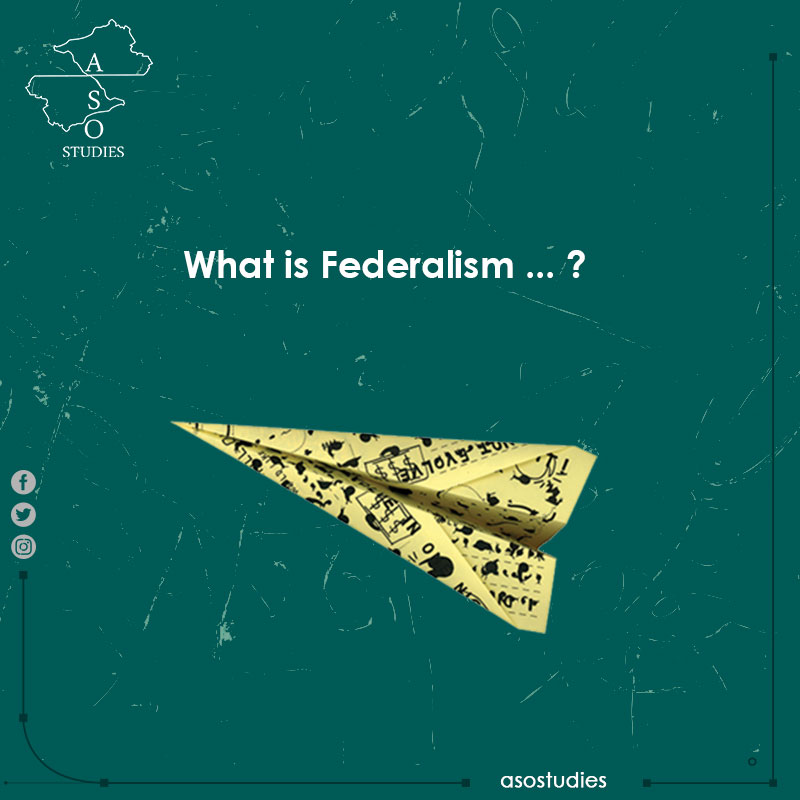What is Federalism ... ?
Operational Definition:
A formula of participatory governance in ethnically and religiously diverse societies, which, by their own free will, pledges the group of territories within a unified state and agrees to share the authority between local governments and the federal government, with the foreign policy of the state remaining in the hands of the federal authorities, without this implying that local governments do not contribute to the formulation of foreign policy.
The History of Federalism:
Several beginnings are available to define the emergence of federalism as a form of consensual government. However, they confuse the confederal agreement that existed between the cities - the Greek Polis. Or what was available between the Swiss provinces, prior their constitutional declaration of 1848. Those alliances were an organization of oligarchy form (oligarchic rule) within the framework of a confederal organization, seeking to regulate relations between distinct and semi-autonomous politically and legally provinces. Therefore, 1787 can be identified as the official start of the adoption of the form of the federal system by the Thirteen Provinces of the United States of America. The borders created by the Treaty of Westphalia, in Europe in 1648, produced 300 administrative districts, consistent with the feudal conception of lands owned by "hands-on". The relationship between them was not organized by a united states with a federal system, but was more like loose federations.
Similar forms of the federal system were adopted in ancient Greek civilization: the Amphitheater Council - League of Elitists - Union of Akhain 281-146 CE. Roman and other civilizations also experienced such alliances.
The German philosopher " Johannes Thussius 1557-1638" was considered by some to be the founding father of the concept of federalism promoted in his book ‘’Politics’’, while this is newly credited to the thinker "KC Wheare" through his book ‘’The Federal Government of 1964.’’
The Major reasons for Adopting Federalism:
The reasons for the emergence of the federal form of government vary from experience to another. Some countries adopt federalism to modify their political paths. As in Germany 1945, where the centralized presidential system of government was transformed to a federal and parliamentary system. Or for economic necessities, such as the experience of Eastern European countries after the collapse of communist regimes. In other experiences, for the necessity to choose ethnically neutral names, such as the Yugoslavia experience in 1939, as well as what the Roman King, Carol did in 1938 by imposing the re-division of the country into ten new regions to eliminate ethnic and sectarian groups. The need for economic growth in Nigeria shifted to an increase in the number of states that wanted to join the federation and to ally themselves within a political-economic federation that started with 12 states in 1967 and became 29 states in 1983. As a consequence, many countries have witnessed stages of development, advancement, prosperity and homogeneity among their people until federalism was seen as a system of advantages. According to the most recent statistic, 28 countries worldwide adopt federal systems with a population of 40% of the Earth's population, of which eight are ranked among the ten largest countries in the world, ‘’George Anderson, Forum of Federations p.1.’’
Geography and Federal System:
There is a fallacy about federalism promoted only in the Arab region. This fallacy states that geographical correlation between the regions is a condition for federation’s establishment, and that is a fundamental mistake. It can be demonstrated first in the Arab region through the relationship between the Emirates and the Sultanate of Oman. The latter, has a city,’’ Damha City”, in the depths of the Emirati territory. On the other hand, Emirates has a city located in the center of the Sultanate's lands since the demarcation between them under British supervision in 1971.
The American model is more evident in the absence of a territorial requirement in the concept of geopolitics of the federal system. The largest of the US states, Alaska, is located outside America and Canada separates it from America. Alaska was part of Tsarist Russia, purchased by America in 1768 for an amount of $7,200 million . It did not officially become an American state until 1959. While France presents another concept for the territories, which belong to it in a federal form, and which are found in other continents, where it describes them as "French Overseas Territories." Therefore, the federal system primarily expresses the free will to enter into a common political system. Federalism, hence, from the point of view of geopolitics, is considered the best way to produce national cohesion in divided, ethnically and religiously diverse societies.
Distribution of Specializations in The Federal System:
In general, federal states adopt the approach of political decentralization to distribute their powers, which is a political system linked to a constitutional status and differs in its concept from administrative centralization in its two patterns, “administrative centralization and administrative decentralization" , as administrative forms, through which central states exercise their functions.
Federalism has various forms. It is classified either according to the manner in which it is formed or by the rules of distributing competencies within it. Or else, by the causes and implications of its application of different systems of governments (monarchy or republic, whether presidential or semi-presidential, parliamentary or council-based, whether in rich or poor countries, large or small, or even in states with geographically separate territories).
The manifestations of the federal state are reflected in two aspects. The first of which, is that its jurisdiction is limited to the federal government through the political representation of the state internationally and diplomatically, the declaration of states of war and peace, and the right to conclude treaties. As well as, internally in supervising the armed forces and other sovereign matters, and the federal constitution may provide specific exceptions in this regard. While the second aspect is internal, whereby the entities retain their own constitution, local governments, their own laws and self-managements.
The federal state consists of two political units: the Federal Center Government and the Regional Government. Each of them has joint and exclusive powers. In addition to the federal parliament, there are regional parliaments, that have the power to enact laws different from the laws of the center and in a manner that does not conflict with the country’s constitution and the exclusive privileges of the central government .
An independent supreme federal judicial body, with the capital of the state, is responsible for oversighting and resolving the various constitutional disputes in the state. It shall also take precedence over any consideration, and its judges shall be appointed in a manner that guarantees impartiality, transparency and the approval of the Council of Units.
The legislative power in the federal state is generally held by a representative body, which is usually composed of two chambers. The first being elected by and representing the entire people of the state, and another council, the "Council of Political Units", with equal representation of the units of the state, regardless of their population or area.
Predictable Deficiencies:
The most possible drawback of the federal system is the failure to take into account the relationship between the cultural diversity and patriotism assumed in the federal system. In addition to the fact that federalism is immune from the dominance of an ethnic or religious majority in a state, overpower, and through elections, given the demographic increase of a group, leading to what Alexis de Tocqueville called "The Tyranny of the Majority," which is the worst form of tyranny. Political science, has therefore, developed the concept of the veto and the concept of consensual democracy, which provides the territorial government to challenge laws that are contrary to the interests of the regions.

